Relevant Overviews
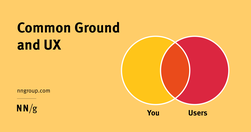
Any efficient communication requires that communication partners establish and rely on common ground so that they can take communication shortcuts.

Succinctly documenting the right details in key places helps Agile teams avoid information overload. When UX documentation is skipped or disorganized, teams waste time trying to find or remember information instead of improving the product.
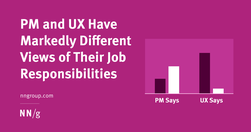
A survey of people in user experience and product management shows that these professionals disagree on who should be responsible for many key tasks, like doing discoveries and early design.

Persistent headers can be useful to users if they are unobtrusive, high-contrast, minimally animated, and fit user needs.
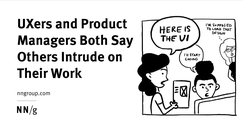
A survey of 372 UX and PM professionals shows that duplicative work is frequent and generates confusion and inefficiency.
Frequent major redesigns and changes throughout the interface support users’ need to learn and adapt to new situations.
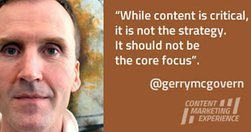
The single most important thing I’ve learned about online marketing is that it is about paying attention. Offline marketing is about getting attention, but once someone is on your website, they know what they want to do, so your first job is to help them do what they came to you website to do as quickly and easily as possible.
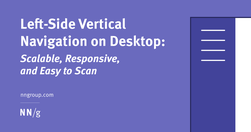
Vertical navigation is a good fit for broad or growing IAs, but takes up more space than horizontal navigation. Ensure that it is left-aligned, keyword front-loaded, and visible.
90% of data does not get used three months after it’s published. Most Web teams know that they are not working in a professional manner, and yet they feel that there is nothing they can do about it. Digital has in so many ways destroyed content professionalism.

The authors of the article "wanted to know more about what really helps scientists talk to the public". Science is essential to solving many of society’s biggest problems, but it doesn’t always find a receptive audience. Today, when curbing COVID-19 ... it’s more urgent than ever for scientists to be able to communicate effectively with the public.
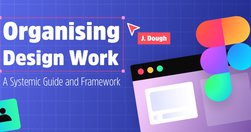
For digital designers who want to organise their working files to improve clarity and collaboration within and across teams
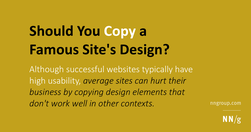
Although successful websites typically have high usability, average sites can hurt their business by copying design elements that don't work well in other contexts.
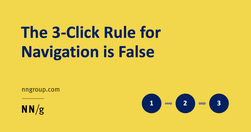
While it is important to keep key information easily accessible, the 3-click rule is an arbitrary rule of thumb that is not backed by data.
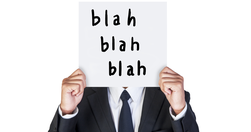
Don’t start with the blah blah blah

Summary: For mobile navigation, image grids should be saved for deeper IA levels where visual differentiation between menu items is critical, as they increase page load times, create longer pages, and cause more scrolling.
We must design things on the basis that we want them to last, ... Because when you expect nothing to last, nothing does.
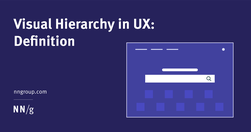
A clear visual hierarchy guides the eye to the most important elements on the page. It can be created through variations in color and contrast, scale, and grouping.

Forget Empowerment. Encourage Autonomy Instead. ... People also need authority.
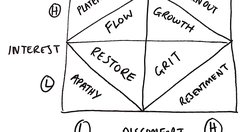
"WHY did I want to quit? ... — ‘is it disinterest or discomfort?’"
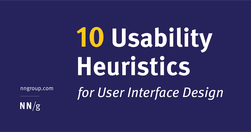
Jakob Nielsen's 10 general principles for interaction design. They are called "heuristics" because they are broad rules of thumb and not specific usability guidelines.

The biggest challenge for distributed teams lies in communication and collaboration.
Want a handy list of the core Clean Language questions? Here goes:
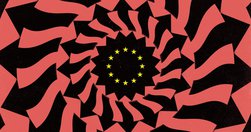
Whether we’re looking at The Correspondent, the world atlas or the national news, migration across the Mediterranean is depicted on maps as thick red arrows heading towards us. Far more than we realise, these arrows define how we view migration. Can that be changed?

ood UI design is all about guiding attention to what’s important. When making the right thing for the user the easy and obvious thing, you can’t ignore cognitive biases. After all, these biases are brain shortcuts that let us quickly and effortlessly make decisions and react to our environment.
The illusion of cheap storage has encouraged by far the worst hoarding habits in human history.
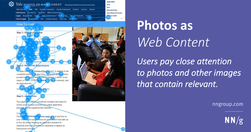
Users pay close attention to photos and other images that contain relevant information but ignore fluffy pictures used to "jazz up" web pages.
Quick accessibility checklist (by European Commission)

“Daily political events consistently evoked negative emotions [which] predicted worse day-to-day psychological and physical health, but also greater motivation to take action aimed at changing the political system that evoked the negative emotions in the first place.”
Law 1 / Reduce - The simplest way to achieve simplicity is through thoughtful reduction.Law 2 / Organize - Organization makes a system of many appear fewer.Law 3 / Time - Savings in time feel like simplicity.Law 4 / Learn - Knowledge makes everything simpler.Law 5 / Differences - Simplicity and complexity need each other.Law 6 / Context - What lie…

"Designers love it, website owners want to fill it. Whitespace seems to be one of the most controversial aspects of design. Why then is it so important and how can we ensure it is maintained?"